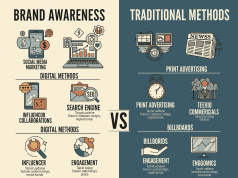In today’s digital landscape, small businesses face an uphill battle against established corporate giants that have substantial resources and reach. However, with the right strategies, creativity, and understanding of their unique advantages, small businesses can carve out a powerful niche in the market. Here’s how small businesses can compete effectively with their larger counterparts using digital marketing.
1. Embrace Niche Markets
One of the greatest advantages small businesses hold over larger corporations is the ability to cater to niche markets effectively. Unlike big companies, which often have to appeal to broader audiences, small businesses can tailor their offerings to meet specific consumer needs.
Actionable Steps:
- Research your market: Use tools like Google Trends and social listening platforms to identify consumer interests and gaps in the market.
- Develop targeted content: Create blog posts, videos, and social media content that speaks directly to your niche audience’s needs.
2. Utilize Cost-Effective Marketing Tactics
Digital marketing offers numerous cost-effective strategies that small businesses can leverage to reach their audiences without breaking the bank.
Actionable Steps:
- Social Media Advertising: Platforms like Facebook and Instagram allow businesses to run highly targeted ads at a fraction of the cost of traditional advertising.
- Email Marketing: Build an email list and engage customers with personalized offers and updates, which is often more affordable compared to other forms of marketing.
3. Leverage Local SEO
While large companies often focus on a national or global scale, small businesses have the edge when it comes to local search. Local SEO is crucial for attracting customers in your immediate area.
Actionable Steps:
- Optimize Google My Business: Ensure your business is listed and optimized on Google My Business to enhance local visibility.
- Use Local Keywords: Incorporate geographic keywords into your website and content to improve search rankings for local queries.
4. Harness the Power of Social Proof
Small businesses can build credibility and trust through social proof, such as customer reviews and testimonials, which large corporations might struggle to localize.
Actionable Steps:
- Encourage Reviews: Request satisfied customers to leave positive reviews on platforms like Google, Yelp, and Facebook.
- Showcase Testimonials: Feature customer stories on your website and social media platforms to highlight your impact.
5. Create Engaging Content
Content marketing allows small businesses to tell their stories effectively and capture the imagination of their audience. By providing valuable, engaging content, small businesses can stand out in crowded markets.
Actionable Steps:
- Blogging: Start a blog to provide industry insights, tips, and how-tos that resonate with your target audience.
- Video Marketing: Utilize platforms like YouTube and TikTok to share videos that showcase your products or offer informative content.
6. Foster Community Engagement
Small businesses often have a direct connection to their communities. By leveraging this human element, businesses can create deeper customer relationships than larger entities.
Actionable Steps:
- Host Events: Organize workshops, open houses, or local sponsorships to engage with the community and build relationships.
- Collaborate with Other Local Businesses: Partnering with other small businesses can amplify your reach while fostering local community support.
7. Utilize Analytics and Data
Digital marketing allows businesses to track and analyze their efforts effectively. Small businesses can use these insights to refine their marketing strategies and make data-driven decisions.
Actionable Steps:
- Set Up Analytics Tools: Use tools like Google Analytics to monitor website traffic, conversion rates, and customer behavior.
- Adjust Marketing Strategies: Regularly assess and adapt your strategies based on the data collected, to optimize performance.
Conclusion
While competing against digital marketing giants may seem daunting, small businesses can leverage their unique strengths to thrive. By embracing niching, utilizing cost-effective marketing, optimizing for local SEO, and engaging with their communities, small businesses can carve out a sustainable and competitive presence in the market.
The key is to think big, act strategically, and maintain a strong connection to your audience. In the digital age, there has never been a better time for small businesses to harness their potential and shine.









